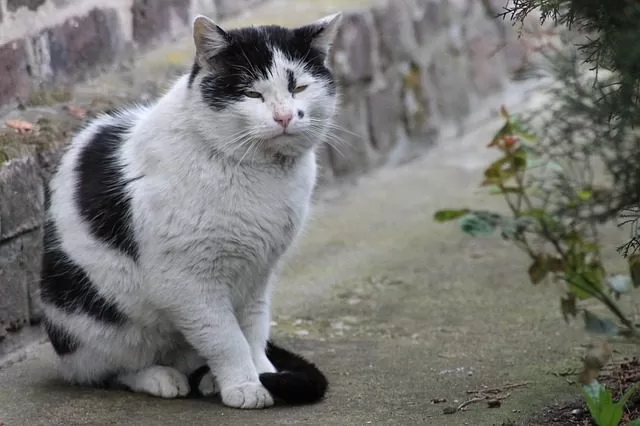Cats are adorable pets and faithful companions throughout their lives. However, just like humans, they also go through the aging process. As cats age, it is important to provide them with proper care to ensure they live a healthy and happy life.
Senior cats have specific needs that differ from those of younger cats. They may show signs of aging, such as decreased energy, weight loss, coat changes and mobility difficulties. It is essential that cat owners are aware of these signs and provide the necessary care.
A vital aspect of ensuring the health of senior cats is disease prevention. As cats age, they become more susceptible to diseases such as kidney failure, diabetes and heart disease. It is important to take your elderly cat to the veterinarian regularly for routine checkups and health monitoring, in addition to keeping its vaccinations up to date.
Proper nutrition also plays a crucial role in caring for senior cats. Older cats have different nutritional needs than younger cats, so it’s important to choose a food specifically for senior cats. These foods contain ingredients that help promote the health of senior cats, such as omega-3 fatty acids for joint health and antioxidants to strengthen the immune system.
In addition to adequate nutrition, elderly cats also need adequate physical activity to maintain their health. Although they may not be as active as they were when they were younger, it is important to provide them with the opportunity to exercise. Interactive toys, such as balls and scratching posts, can help stimulate aging cats and keep their minds and bodies active.
Oral health is also an important area of care for senior cats. Dental problems, such as periodontal disease and tooth loss, can be common in older cats. Brushing your cat’s teeth regularly and providing food or toys that help clean their teeth can help prevent oral problems.
In conclusion, caring for senior cats is essential to ensuring they live a healthy and happy life. Disease prevention, adequate nutrition, physical exercise and oral health care are important aspects to consider. Additionally, regular health monitoring through vet visits is critical to ensure any problems are identified early and treated appropriately.
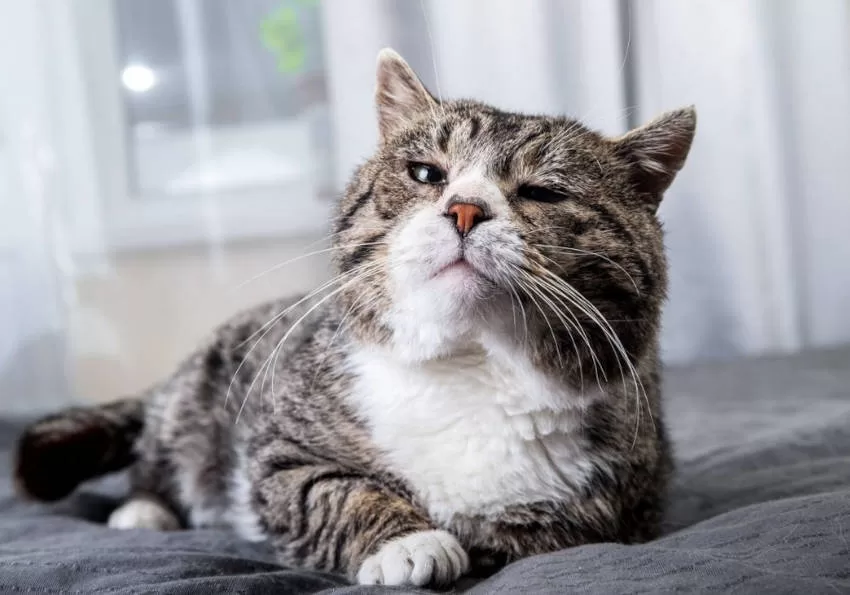
Common Signs of Aging in Cats
As cats age, it is important to be aware of signs of aging to provide appropriate care. Some common signs of aging in felines include:
- Reduced activity: Elderly cats tend to become less active and spend more time sleeping. They may not show the same enthusiasm for play or exercise as they once did.
- Mobility problems: Some elderly cats may have difficulty jumping, climbing stairs or even walking. This could be due to stiff joints or the development of conditions such as arthritis.
- Weight loss: As cats age, they may lose weight even when eating normally. This may be due to changes in metabolism or underlying health problems.
- Changes in appetite: Some elderly cats may lose interest in food or show changes in eating patterns. It is important to monitor your cat’s appetite and consult a veterinarian if there are significant changes.
- Vision and hearing problems: Elderly cats may experience decreased visual and hearing acuity. They may have difficulty seeing or hearing properly, which can affect their behavior and interaction with the environment.
- Changes in behavior: Some elderly cats may show changes in behavior, such as becoming more aggressive, irritable or showing greater anxiety. These changes may be the result of health problems or physical discomfort.
When you identify these signs of aging in your cat, it is essential to seek appropriate veterinary care. The veterinarian will be able to carry out a complete assessment of your cat’s health and recommend the best care and treatments to ensure the animal’s well-being in its elderly phase.
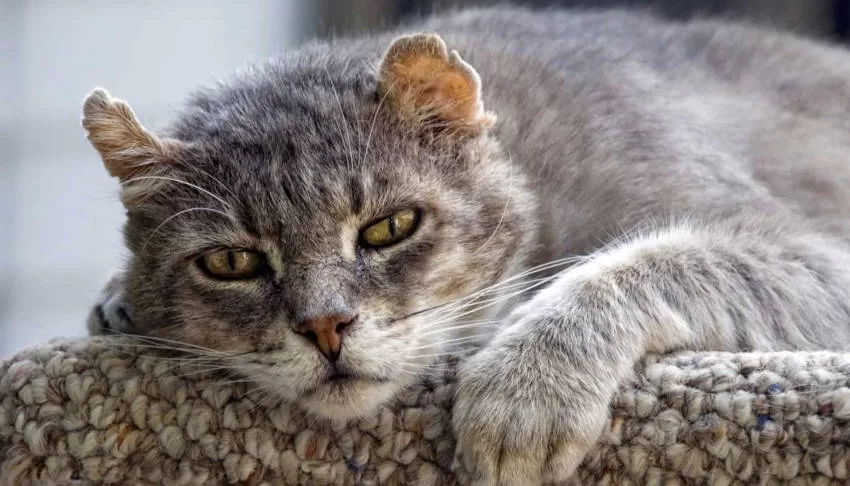
Importance of disease prevention in elderly cats
When dealing with senior cats, it is crucial to recognize the importance of disease prevention. As cats age, they are more likely to develop a range of health conditions, such as heart disease, diabetes, kidney problems and arthritis. However, it is possible to minimize these problems through appropriate preventive care.
One of the main ways to prevent diseases in elderly cats is to ensure regular visits to the veterinarian. Routine exams allow your veterinarian to detect any health problems early and take the necessary steps to prevent the condition from worsening. Additionally, your veterinarian may recommend specific tests to monitor your cat’s health, such as blood tests to detect kidney or heart problems.
In addition to regular visits to the veterinarian, it is essential to keep the cat’s environment clean and free of toxic substances. Elderly cats are more sensitive to chemicals and toxic products, so avoid using harsh cleaning products or pesticides near the places where your cat spends most of its time.
Another important measure in preventing diseases in elderly cats is to ensure that they have a healthy and balanced diet. Senior cats have specific nutritional needs, such as a higher intake of protein and omega-3s to promote kidney and joint health. Consult your veterinarian for recommendations on the best diet for your senior cat.
Additionally, it is essential to keep your cat’s weight within a healthy range. Excess weight can lead to a range of health problems, such as diabetes and heart disease. On the other hand, excessive weight loss can also indicate underlying health problems. Therefore, closely monitor your senior cat’s weight and adjust her diet as needed.
Finally, make sure your senior cat has access to fresh, clean water at all times. Dehydration is a common problem in older cats and can lead to serious complications. If necessary, consider offering your cat extra water sources, such as drinking fountains or larger bowls.
Preventing disease in senior cats is critical to ensuring they can enjoy long, healthy lives. Keep an eye out for warning signs and see your veterinarian regularly to ensure your cat is receiving appropriate care.
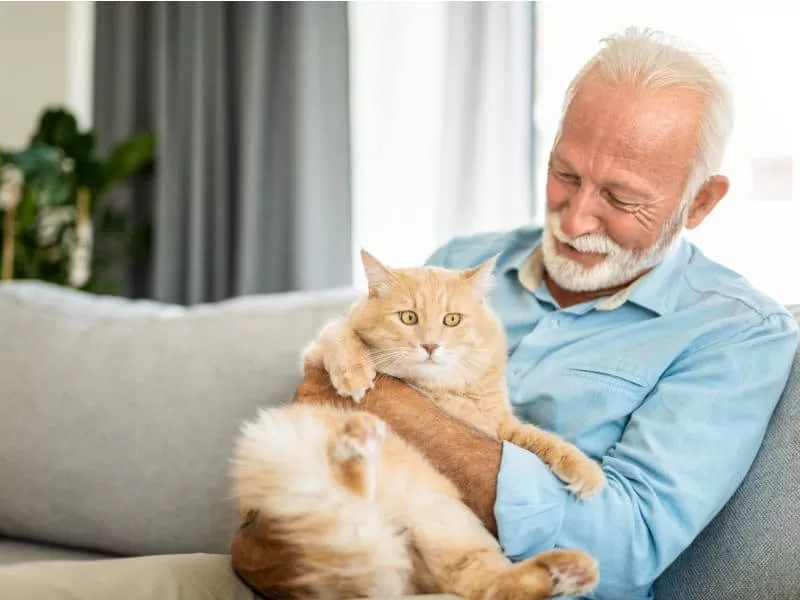
Proper food for elderly cats
As cats age, their nutritional needs may change. It is important to provide adequate nutrition to ensure they receive the nutrients they need to stay healthy. Here are some tips for feeding senior cats:
- Choose a specific food for elderly cats: There are foods formulated especially for older cats, which contain nutrients and vitamins essential for their health. These foods are designed to meet the specific needs of senior cats, such as maintaining muscle mass and joint health. Consult your veterinarian to choose the best option for your cat.
- Control the amount of food: As cats age, they tend to have a slower metabolism and can gain weight easily. It is important to control the amount of food offered, avoiding excesses that could lead to obesity. Follow the manufacturer’s recommendations and adjust the amount as needed based on your cat’s weight and body condition.
- Offer a balanced diet: In addition to food, elderly cats can benefit from wet foods, such as pates and sachets, which are easier to chew and digest. These foods help maintain hydration and can be an alternative for cats with dental problems. Also include foods rich in omega-3, such as fish, which help maintain healthy skin and coat.
- Consider dietary supplements: In some cases, your veterinarian may recommend supplementation with specific vitamins, minerals, or other nutrients for senior cats. These supplements can help complement the diet and make up for nutritional deficiencies.
- Divide meals into smaller portions: Senior cats may have difficulty eating large amounts of food at once. Dividing meals into smaller portions and offering them throughout the day can help avoid digestive discomfort and improve food acceptance.
- Keep water available at all times: Adequate hydration is essential for the health of elderly cats. Make sure your cat has access to fresh, clean water at all times. If necessary, place water containers in various locations around the house for easy access.
Remember that each cat is unique and may have specific needs. It is important to consult your veterinarian regularly to monitor your elderly cat’s health and obtain guidance on the appropriate diet for him. With the right care, your cat can enjoy a long, healthy life even into old age.
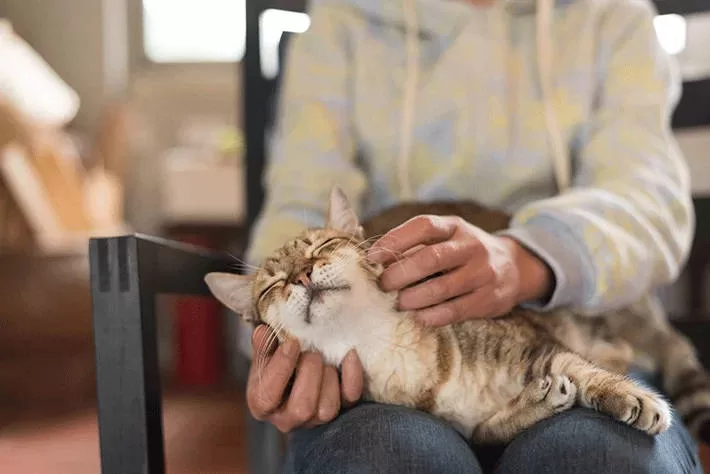
Exercises and physical activities for senior cats
As cats age, it is common for their energy to decrease and their physical activities to reduce. However, it is important to continue encouraging your senior cat to move and exercise to maintain its health and well-being.
There are several physical activities that may be suitable for senior cats, taking into account their specific limitations and needs. Here are some suggestions:
1. Interactive toys
Interactive toys can be a great way to keep your senior cat active and mentally stimulated. They can include toys with lights, movements or sounds that pique the cat’s interest and encourage it to move. Be sure to choose toys that are safe and appropriate for your cat’s age.
2. Short play sessions
Although senior cats may not have the same energy they had when they were younger, it’s still important to take time to play with them. Short play sessions, with toys like feathered wands or stuffed mice, can be a fun way to exercise your cat’s body and mind.
3. Adapted cat tree
An adapted cat tree can be an excellent option for elderly cats. Be sure to choose a cat tree with lower platforms that are easy for your cat to access, and have comfortable resting spaces. This will allow him to climb up and down with ease, as well as allowing him to exercise by jumping or scratching the posts.
4. Mental stimulation
In addition to physical exercise, it is also important to stimulate your elderly cat’s mind. You can do this by offering toys that stimulate their hunting instinct, such as food puzzles or feeding mats. These activities help keep your cat mentally active and also provide a form of exercise.
Remember to always respect your elderly cat’s limits. If he shows any signs of discomfort or excessive tiredness during physical activities, stop immediately and consult a veterinarian. Each cat is unique and may have different needs, so it is important to adapt physical activities according to your cat’s condition and capabilities.
With proper care and stimulation, your senior cat can enjoy a healthy, active life, even into old age.
Oral health care for elderly cats
Oral health care for elderly cats is extremely important, as adequate oral health can affect the animal’s general well-being. Just like humans, cats can also develop dental problems as they age.
One of the most common problems is the accumulation of plaque and tartar on teeth, which can lead to periodontal disease, gingivitis and tooth loss. Additionally, poor oral health can also affect your cat’s diet, causing pain when chewing and difficulty eating.
To maintain your elderly cat’s oral health, it is important to adopt some care practices regularly. One of them is to brush your cat’s teeth with a pet-specific toothbrush and toothpaste. It is important to be patient and gradually get your cat used to this routine, making it a positive experience.
In addition to brushing, there are also specific products to help cats’ oral health, such as antiseptic mouthwash solutions and toys that help clean their teeth. These products can be used as a complement to daily brushing.
Another important aspect of caring for the oral health of elderly cats is adequate nutrition. Dry, crunchy foods can help reduce plaque buildup on teeth, while wet foods can contribute to tartar formation. Therefore, it is recommended to offer a combination of both types of food, always taking the cat’s individual needs into account.
In addition, it is essential to have regular dental checkups with your veterinarian to identify dental problems early and adopt appropriate treatment. The veterinarian will be able to professionally clean the cat’s teeth, if necessary, and provide specific guidance on the animal’s oral health.
In short, oral health care for elderly cats is essential to guarantee the animal’s well-being and quality of life. In addition to regular tooth brushing, it is important to provide adequate nutrition and have regular dental checkups with your veterinarian. This way, it is possible to prevent dental problems and promote good oral health as your cat ages.
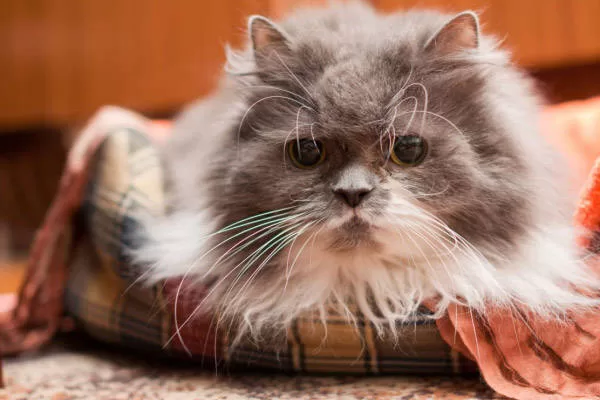
Preventing diseases with vaccination in elderly cats
Vaccination is an essential part of healthcare for senior cats. As cats age, their immune systems can become weaker, making them more susceptible to disease. It’s important to keep your cat’s vaccination schedule up to date to ensure your cat is protected against potentially dangerous diseases.
There are several vaccines recommended for senior cats, including the rabies vaccine, the feline leukemia vaccine, and the triple vaccine. The rabies vaccine is mandatory in many areas and is important to protect your cat from a deadly disease that can be transmitted to humans. The feline leukemia vaccine is recommended for cats that have access to the outdoors, as it exposes them to other cats and increases the risk of contracting the disease. The triple vaccine protects against three common diseases in cats: panleukopenia, feline calicivirus and feline viral rhinotracheitis.
It is important to discuss with your veterinarian which vaccines are best suited for your senior cat, taking into account his vaccination history and lifestyle. Additionally, your veterinarian may recommend adjustments to the vaccination schedule to meet your cat’s specific needs.
It is important to remember that vaccination does not guarantee absolute immunity against all diseases, but it helps to reduce the risk of contracting them. Additionally, even if your cat received vaccinations when he was younger, it is essential to continue vaccinations into old age to ensure continued protection.
In addition to vaccination, it is essential to maintain a clean and safe environment for your senior cat. This includes regularly cleaning the litter box, keeping fresh, clean water available at all times, and avoiding contact with sick or unfamiliar cats.
In summary, vaccination is an important part of healthcare for senior cats. It helps prevent potentially dangerous diseases and should be discussed with your veterinarian to ensure the vaccination schedule is up to date and suited to your cat’s individual needs. By combining vaccinations with other preventive care, you can help keep your senior cat healthy and happy for many years to come.
Regular Health Monitoring of Senior Cats
As they reach old age, cats may be more susceptible to a range of health problems. Therefore, it is essential to regularly monitor the health of elderly cats in order to identify any problems at an early stage and ensure appropriate treatment.
One of the most important aspects of monitoring the health of senior cats is regular visits to the veterinarian. It is recommended that older cats be examined at least twice a year. During these appointments, your veterinarian may perform complete physical exams, assess blood pressure, perform laboratory tests, and check your cat’s overall health.
In addition to visits to the veterinarian, it is essential that owners also pay attention to the signs and symptoms of health problems in elderly cats. These signs may include unexplained weight loss, changes in appetite, difficulty moving, lethargy, increased thirst or urination, frequent vomiting, persistent diarrhea, among others.
To help monitor the health of elderly cats, resources such as health diaries can be used, in which owners can note any unusual behavior, changes in diet or medication administered. These notes can be helpful during veterinary appointments, providing additional information for proper diagnosis and treatment.
Furthermore, it is important to keep your elderly cat’s vaccinations up to date. Their immune system may be weaker, making them more prone to infections. Therefore, following the vaccination schedule recommended by your veterinarian is essential to prevent disease.
Finally, it is essential to take care of the mental and emotional health of elderly cats. Ensuring a calm, comfortable and stimulating environment can help reduce stress and improve your cat’s quality of life. Daily games and interactions with the owner are also important to keep the cat mentally active.
In conclusion, regularly monitoring the health of senior cats is essential to ensure they live long, healthy lives. Carrying out regular veterinary appointments, paying attention to signs of health problems, keeping vaccinations up to date and taking care of the cat’s emotional well-being are important measures to ensure a good quality of life at this stage of the feline’s life.
External Links:

